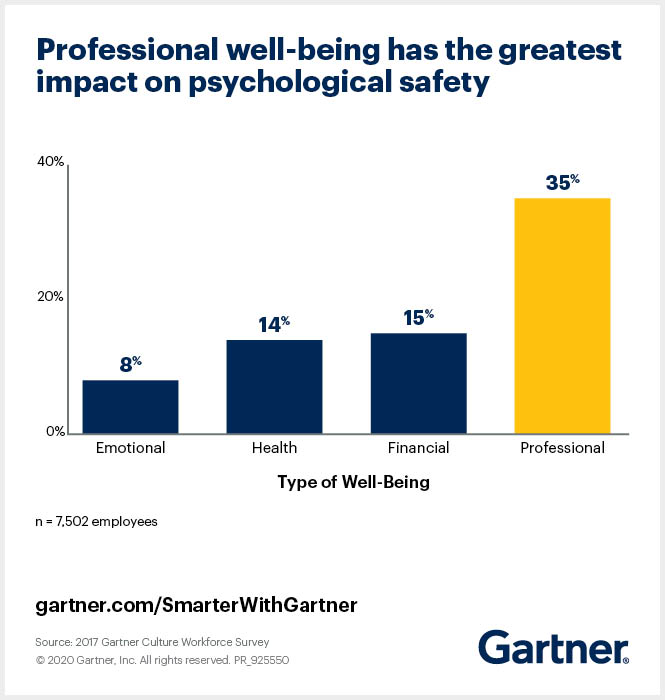Increase team performance and empower employees during the uncertainties of coronavirus by creating a psychologically safe environment. People who indicate they have high levels of professional well-being are more likely than their peers to say they feel psychologically safe at work.
Psychological safety — a shared belief among team members that they feel comfortable about taking interpersonal risks like admitting vulnerabilities and owning their mistakes influences workforce productivity, voluntary turnover, and discretionary effort.
There are four types of well-being:
- Emotional well-being. For example, I had a good night of sleep last night.
- Health well-being. For example, I feel good about my personal health.
- Financial well-being. For example, I am feeling very confident about my current financial security.
- Professional well-being. For example, my manager and I are getting along well.
Of the four types of well-being, professional well-being has the most significant impact on psychological safety, more than twice that of financial well-being, which has the second-highest impact. Leading technology companies rate psychological safety as a top characteristic of a successful team, with the discretionary effort exerted by staff increasing by nearly 25%, according to a Gartner survey.
When individuals lack a sense of professional well-being, they have a natural aversion to admitting vulnerabilities and speaking up in group settings. Those who feel most vulnerable to exclusion or persecution for their mistakes are less likely to ask questions or critique the status quo, even when it would benefit the larger team.
CIOs play a key role in improving psychological safety but are unclear on what they can do to make a difference in the short amount of time that is required during the coronavirus outbreak. Cultivate professional well-being by creating an environment where mistakes are turned into group learning opportunities, specifically:
- Regularly reach out to employees for clarity on their priorities during the COVID-19 crisis. Focus on outcomes and timelines and allow them to figure out how to complete work in ways that work best for them.
- Look for opportunities to provide constructive feedback to staff outside the otherwise-prescribed management process. Taking time out of your day to have a virtual coffee chat with an employee to talk about his or her work can have a greater impact than a formal performance discussion.
- Hold career path conversations with your direct reports. During times of uncertainty, especially, employees will be questioning whether the paths they had charted for themselves are still viable. Bring up the discussion first so that your employees don’t have to raise it. You can tell them only what you know, but keeping in tune with their career desires can serve you well.
























